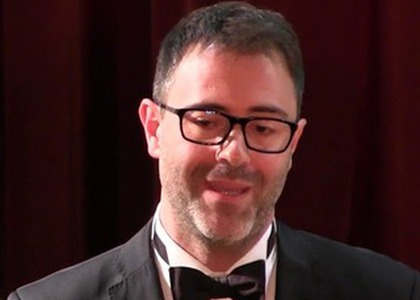> Interviews

Interview with pianist Ștefan Doniga
On Friday, March 24th, at Sala Radio you will have the opportunity to watch Ștefan Doniga with the National Radio Orchestra in a first Romanian audition of Concert no. 3 for piano and orchestra signed by the Ukrainian composer Serghei Bortkiewicz. We learn more about this event from the soloist in a dialogue with Ioana Țintea.
Ștefan Doniga, with what thoughts are you waiting for the reunion with the audience at Sala Radio?
With great joy, first of all. This feeling surpasses any thought and it is beautiful for an artist that it happens this way. I feel that art should be made first and foremost with joy. I have been reading Wilhelm Furtwängler's interviews since I was a child, and he said that if you do not do music with joy or with pleasure you better not do it at all. So beyond any thought is this joy of making music that means a lot to me, and maybe this is where the other thoughts come from, to awaken in the souls of those who will be in the hall the interest in works heard in the premiere.
In the company of the National Radio Orchestra you will perform Concert no. 3 for piano and orchestra signed by the Ukrainian composer Serghei Bortkiewicz. You are a real trailblazer in terms of approaching Serghei Bortkiewicz's creation in the Romanian musical landscape. What significance does this aspect have for you and what are the responsibilities that accompany you in this achievement?
It is a privilege to be able to touch this music for the first time as a musician and not for the first time for me. Keeping the proportions, I like to think it is that feeling that Champollion probably had when he discovered the rosetta stone, when he understood how to make the connections between those marks. Because that is what I felt when I first made the connections between these marks on the sheet music meaning the musical notes. I received these scores at a time when no one alive on earth had listened to this music, and I am not exaggerating, that was the case, I was the only person who was starting to listen again, after almost a century since these scores, this music, had been lost. Obviously the impulse initially led me to believe that it was just a documentary endeavor and that the music was worthless, but what was building under my hands when I was learning this score, made me understand how wrong I was and that I was really discovering a universe. That's a tremendous responsibility, because you know that all the years to come and this music will be played, everything will be related from now on to the music that you made because you were the first to ever imprint it.
What was your first encounter with this concert and what are the reasons that led you to turn to this opus?
In 2008 I met this concert for the first time, when it was proposed to me by the Netherlands Music Institute in The Hague, to make this world premiere print. There were actually two piano concertos, one for the left hand only and this concerto no. 3. Scores recently discovered at that time around 2005 were brought back to the present and this institute in The Hague was doing this documentary approach, it is very true, but a lot was gained through this approach, because a music of extraordinary energy was discovered, very attractive and very much liked. The public success of this disc was very high. It isstill everywhere, on Amazon, on Ebay, on iTunes, everywhere. So that was the initial contact, after which I started playing it and I played it with many philharmonics.
How do you see the joining of SergheiBortkiewicz's creation with works signed by Brahms and Beethoven?
Absolutely meritorious. I am glad that even with the effort I made, I do not want to glorify myself in this whole context, but I realize that also through my work and my approach this huge composer of late romanticism is slowly regaining his place. And the fact that on the poster he is between these two big B's, here's a third B, because generally the three B's were Bach, Brahms, Beethoven. But Brahms, Bortkiewicz, Beethoven are also possible.
I know you had a first meeting with conductor Boian Videnoff. How do you describe working with him?
Excellent. He is a musician of high quality. You can see the universal course in his structure, even if he is disturbingly young from my point of view, but he is a musician of high quality, of great consistency, with a good conducting school and reliable support on stage. After all, we do not sing with the pedigree, but we sing with the person in front of us and along with the National Radio Orchestra Ensemble which is an extraordinarily valuable ensemble and which I also want to greet in this way, because it is largely made up of very close friends. And I want to thank them for being with me on stage doing me this honor and joy. I am very confident in the ability to delight the audience in the hall. We return to the point from which we started this discussion, the joy that we are trying to give to the audience, and we want to do that.
Translated by Elena Patricia Măroiu,
University of Bucharest, Faculty of Foreign Languages and Literatures, MTTLC, year II
Corrected by Silvia Petrescu














